Farming in the Bible offers fascinating insights into spiritual truths, uncovering a profound connection between agriculture and scripture.
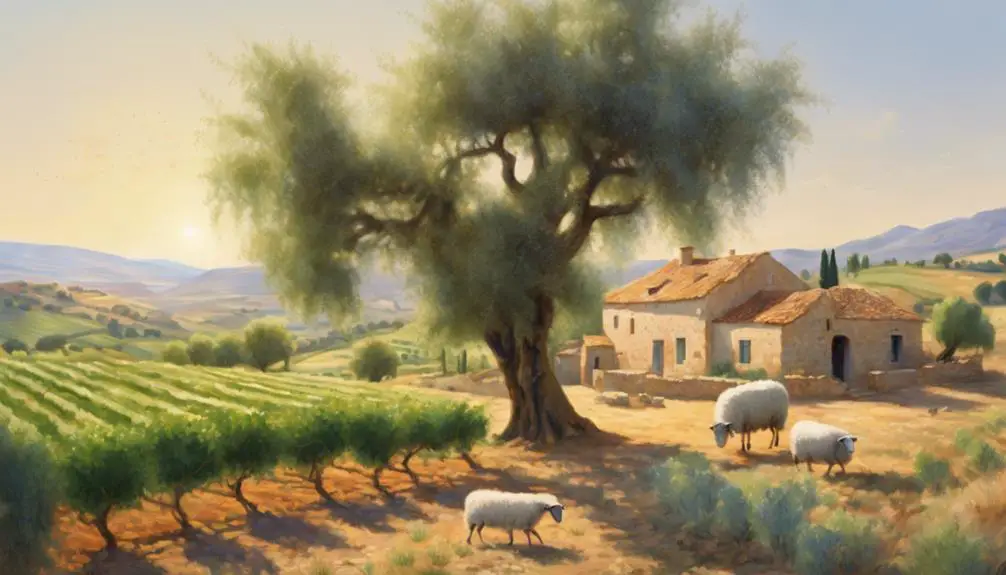
Farms in the Bible
Did you know that over 40 parables and teachings in the Bible involve farming analogies?
As you explore this intriguing correlation, you'll find farm-related metaphors and anecdotes are common throughout the scriptures, often used to explain spiritual concepts.
This prevalence of agricultural imagery not only emphasizes the importance of farming in biblical times but also suggests a deeper, more symbolic connection.
You may start to wonder, what spiritual truths might these farming references be meant to convey?
Key Takeaways
- Farms and farming practices in the Bible showcase ingenuity and deep respect for nature.
- Biblical farming parables offer profound insights into human spirituality and divine expectations.
- Agriculture metaphors in the scriptures illuminate concepts of moral conduct and spiritual growth.
- The significance of farms in the Bible extends beyond agriculture, symbolizing spiritual life and divine interaction.
Biblical Significance of Farming
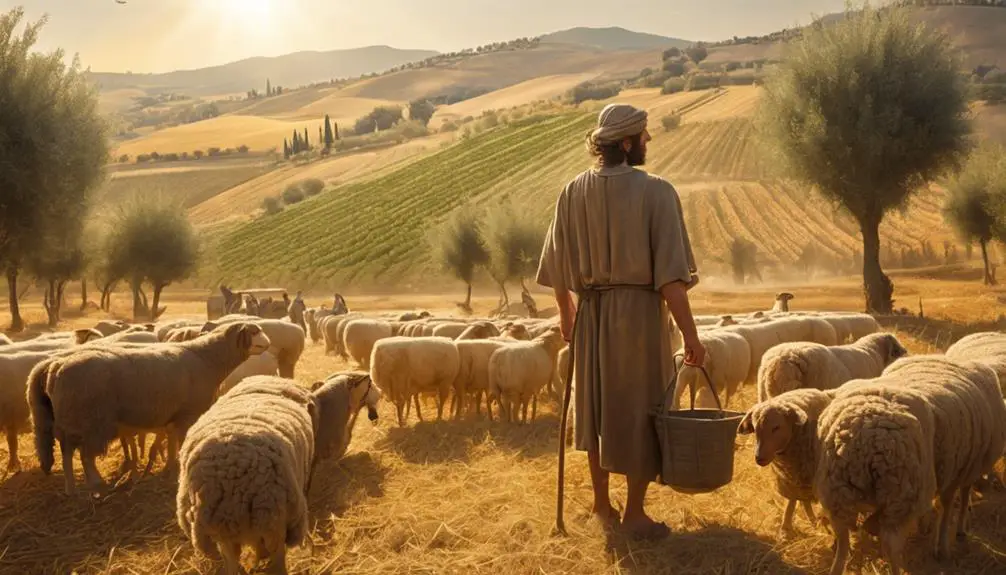
In the rich tapestry of the Bible, farming isn't merely a mundane task of tilling the soil; it carries profound spiritual symbolism and serves as a metaphor for spiritual growth and divine providence. This divine farming symbolism is embedded deeply within the core narratives and teachings of the scripture. As you delve into the Biblical text, you encounter numerous references to sowing, reaping, and harvesting, each symbolizing different aspects of spiritual life and divine interaction.
Biblical crop references serve as metaphors for the human condition and our relationship with God. Consider the Parable of the Sower in the Gospel of Matthew. The various types of soil represent human hearts, and the seeds symbolize the Word of God. The diverse responses of the soils to the seed mirror our varied reactions to God's message.
In the book of Corinthians, Paul uses farming imagery to depict the process of spiritual growth: 'I planted, Apollos watered, but God gave the growth.' This reinforces the idea that while human efforts are crucial, it's divine providence that ultimately brings about spiritual growth and fruitfulness. Therefore, divine farming symbolism and biblical crop references convey spiritual truths about human life, divine interaction, and spiritual growth.
Agriculture in Early Biblical Societies
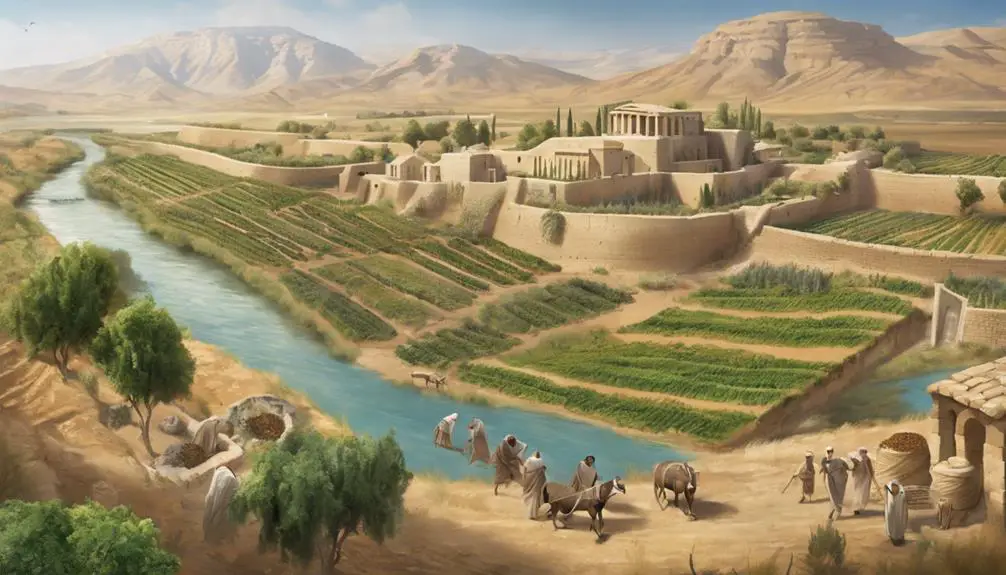
Delving into the agricultural practices of early biblical societies, you'll find that farming wasn't just a means of survival but a fundamental aspect of their culture and spirituality. Crop cultivation, for instance, was intricately tied to their understanding of the divine, with cycles of planting, growth, and harvest mirroring spiritual themes of life, death, and renewal.
Examining their irrigation innovations, you see a society that wasn't merely at the mercy of the elements but was active in shaping its environment. They developed complex systems to manage water resources, demonstrating a high level of technical skill and ingenuity. These innovations also underscore the importance they placed on agriculture, as the effort and resources invested in irrigation were considerable.
The produce of these early biblical societies was diverse, including grains, fruits, and legumes. This diversity indicates a sophisticated understanding of crop rotation and soil health, further emphasizing their agricultural prowess.
Farming Parables in the Bible
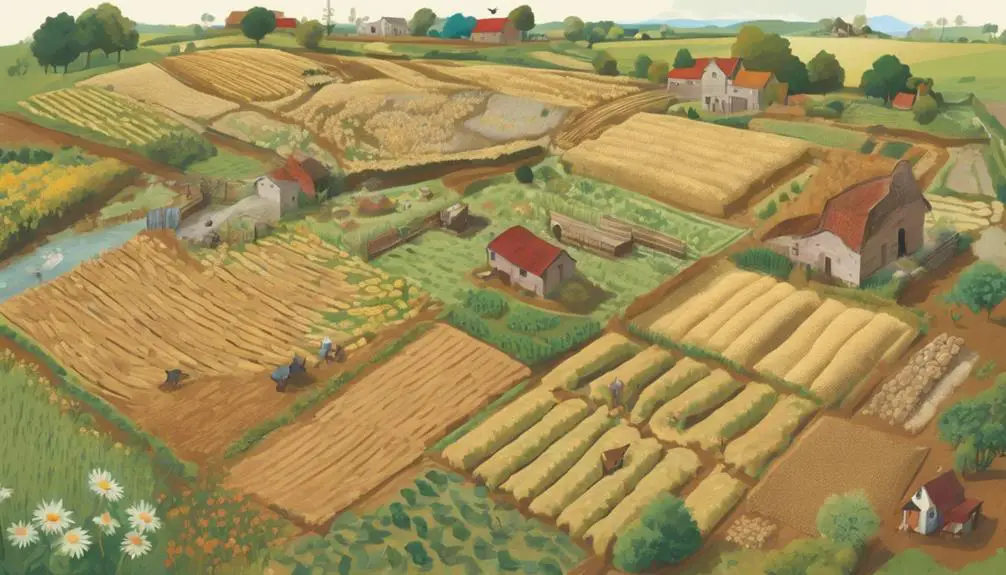
Moving beyond the physical reality of agriculture, you'll find that farming also permeates the spiritual and moral teachings of the Bible, particularly through the use of parables. These parables, replete with agricultural metaphors, serve as vehicles for conveying profound truths about the human condition and Divine expectations.
Delving into parable interpretations, consider the Parable of the Sower. Here, seeds, representing the word of God, fall on different types of ground symbolizing various human responses to Divine teachings. The yield of the crop is directly tied to the condition of the ground, providing a powerful visual of spiritual receptivity.
Similarly, the Parable of the Wheat and the Tares gives a glimpse into God's judgment. The wheat signifies the righteous, while the tares represent those who reject righteousness. The farmer's decision to let both grow until harvest time suggests that God's judgment is patient and discerning.
Symbolism exploration in these parables provides us a deeper understanding of spiritual concepts. The farming parables in the Bible, therefore, go beyond mere agricultural narratives. They're subtle, multi-layered allegories that offer a wealth of insight into life, spirituality, and morality.
Spiritual Teachings and Agriculture
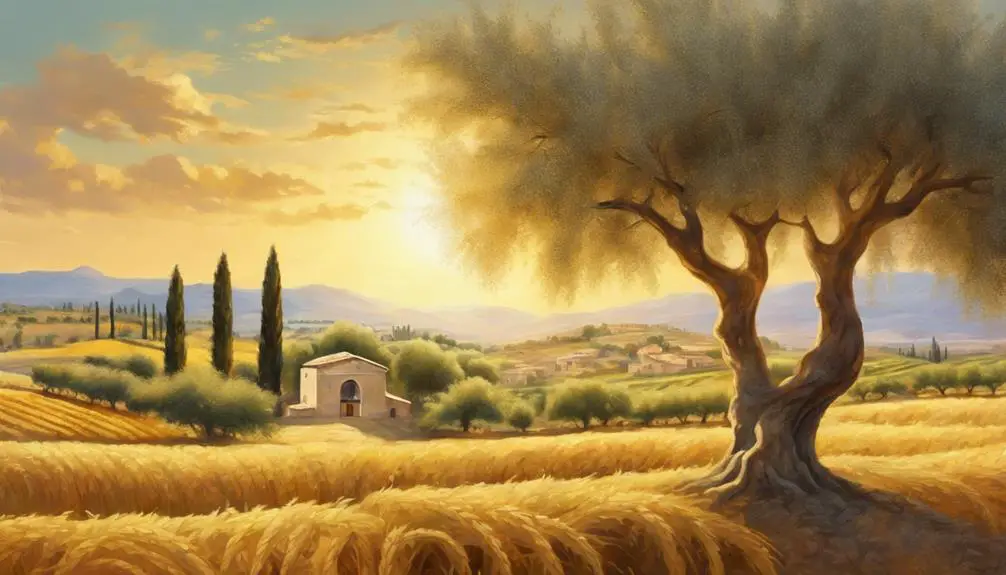
Drawing from the rich tapestry of agricultural life, the Bible frequently uses farming as a metaphor to illuminate spiritual teachings and moral lessons. You're invited to explore two significant themes: Divine Harvesting and Sacred Soil, which are deeply intertwined in biblical texts.
Divine Harvesting symbolizes the spiritual reaping of one's actions. In Galatians 6:7, it's stated, 'Do not be deceived: God can't be mocked. A man reaps what he sows.' Here, the act of sowing and reaping underscores the principle of cause and effect, karma, or divine justice. It's a reminder that your actions today determine the quality of your spiritual harvest tomorrow.
Sacred Soil, on the other hand, represents the fertile ground of the heart, where the seeds of faith, love, and righteousness are planted. In Matthew 13:1-23, the Parable of the Sower, Jesus explains how the condition of one's heart—likened to soil—affects the growth of spiritual truths sown within. It highlights the importance of nurturing your inner soil to yield a bountiful spiritual harvest.
Thus, these agricultural metaphors provide invaluable insights into the spiritual life, shedding light on moral conduct and spiritual growth.
Farming Practices in Biblical Times
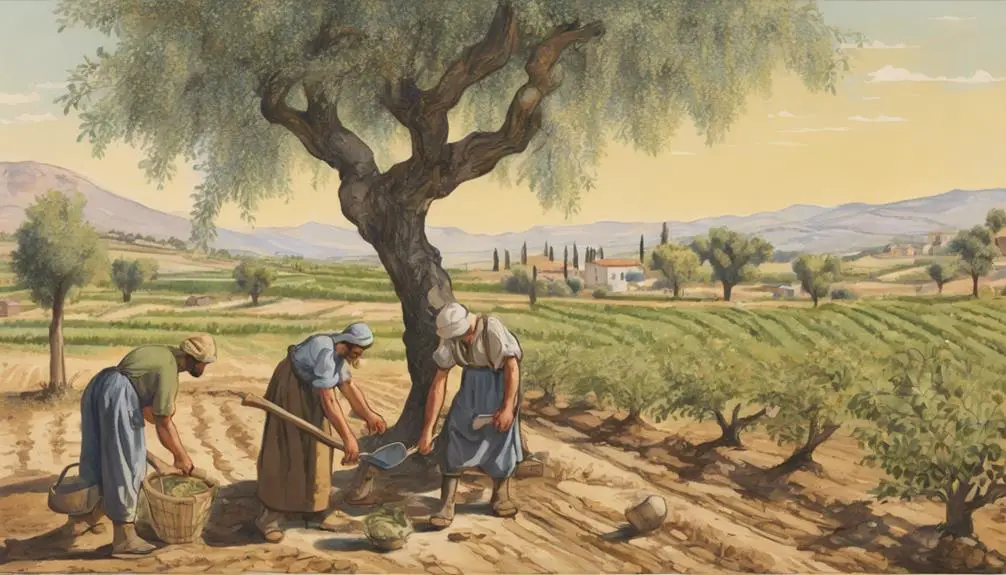
Now, as we turn our attention from the metaphoric usage of farming to the literal practices, it's fascinating to note how farming methods during biblical times mirror not only the technological capabilities but also the cultural and societal norms of the era. Notably, Biblical crop rotation and ancient irrigation methods played a crucial role in these practices.
You'll find that Biblical crop rotation was a sophisticated practice, despite the era's limited technological advancements. It was a clear demonstration of the people's understanding of the importance of soil fertility and sustainability. They'd grow different crops in a sequential manner on the same plot of land, thus preventing the soil from being stripped of its vital nutrients. This method also helped in pest control, keeping their crops healthy and bountiful.
Ancient irrigation methods, on the other hand, were a testament to their ingenuity and adaptability. They relied heavily on techniques like flood irrigation, where they'd divert water from rivers to their fields during the flood season. These water-management strategies weren't only practical but also environmentally conscious, reflecting their deep respect for nature.
In essence, these practices showcase the wisdom and resourcefulness of farming in biblical times, offering us valuable insights into their agrarian lifestyle.
Frequently Asked Questions
What Specific Crops Were Mentioned in the Bible, and What Was Their Significance?
You're curious about specific crops in the Bible and their significance, aren't you?
Wheat, figs, olives, and grapes are among the crops mentioned. They're not just food sources; they're rich in Biblical crop symbolism.
For instance, wheat often represents God's people, while grapes symbolize abundance and fertility. Agricultural parables in the Bible further use these crops to convey spiritual truths, making them integral to the scripture's narrative.
Were There Any Specific Farming Tools or Machinery Mentioned in the Bible?
You're asking about specific farming tools or machinery mentioned in the Bible. Well, the Bible doesn't mention modern machinery, but it does describe ancient farming practices.
Biblical ploughing techniques are referenced, often using oxen and a simple plough.
Ancient irrigation methods are also depicted, such as digging channels for water flow.
These details show the Bible reflecting the agricultural practices of its time.
How Did Farming Influence the Lifestyle of Biblical Figures?
Farming greatly shaped the lives of biblical figures. It wasn't just about survival, but also about adhering to Biblical Farming Ethics. They'd respect the land, practice fair labor, and share their harvest with the less fortunate.
Moreover, agriculture held deep Spiritual Symbolism, representing growth, renewal, and God's providence. So, you see, farming didn't just influence their physical lifestyle, but also their spiritual understanding and ethical conduct.
What Were the Roles of Women in Farming in Biblical Times?
In biblical times, women played pivotal roles in society, including farming. They didn't just maintain the household, they also contributed to agricultural tasks. They'd plant, harvest, and process crops. They were also responsible for small livestock. They were unsung heroes—an integral part of Biblical feminism.
Their contributions in farming challenged gender roles, demonstrating their capability beyond traditional expectations. Their roles weren't just confined to nurturing families but extended to nurturing the land as well.
Does the Bible Provide Any Guidance on Modern Agricultural Practices?
You mightn't find specific guidance on modern agricultural practices in the Bible. However, principles of 'Biblical sustainability' and 'Divine farming' are present. These concepts emphasize stewardship, respect for the land, and balanced use of resources.
While they don't directly address modern techniques like genetic modification or pesticide use, they provide a framework for ethically and sustainably interacting with the earth.
Conclusion
In closing, it's clear that farming holds a profound place in the Bible. It not only represents an essential livelihood in ancient societies, but also serves as a metaphor in parables to teach spiritual lessons.
By understanding these agricultural practices, their significance, and their metaphorical uses in the Bible, you gain a deeper insight into the biblical world, its teachings and its enduring influence.
This study illuminates the rich interplay between daily life and spiritual growth in biblical times.



Sign up